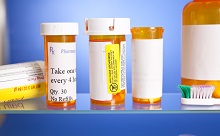Doing our part for a drug-free environment
 Did you know medication that goes down the drain ends up in the ocean? This negatively impacts the marine environment and many fish and critters that call it home.
Did you know medication that goes down the drain ends up in the ocean? This negatively impacts the marine environment and many fish and critters that call it home.
Unfortunately, tossing medication in the garbage is not a good idea either. Medication in household garbage is not only easily accessible to children, pets and wildlife, but once it reaches the landfill, it can eventually end up in the marine environment.
It's easy to safely dispose of your expired or unused medications.
Simply take your medications to one of the many pharmacies that is participating in the Medications Return Program (MRP). You can look up nearby return locations by using your postal code.
About the Medications Return Program
The MRP collects expired or unwanted medication for proper and safe disposal, which gives the pharmaceutical industry a collective means of adhering to the requirements of the British Columbia Recycling Regulation. The MRP is administered by the Health Products Stewardship Association, which is funded by brand-owners selling pharmaceuticals in British Columbia.
In 2020 the Medications Return Program collected over 10,000kg of unused or expired medications from CRD residents.
Frequently Asked Questions
Why are medications in the sewage a concern?
Some medications are effectively removed or broken down by sewage treatment; other medications can pass through treatment and enter the environment unchanged. Although the potential impact of pharmaceuticals in the environment is unknown, the best way to minimize the possible effects is to dispose of unused or expired medications at a local MRP-participating pharmacy.
What’s wrong with throwing medication down the drain or in the garbage?
Medication that goes down the drain ends up in the ocean, where it can have a negative effect on the marine environment. Medication in household garbage is not only easily accessible to children, pets and wildlife, but once it reaches the landfill, it can enter the leachate collection system and eventually wind up in the marine environment.
Do I have to pay to dispose of medication at the pharmacy?
No. The collection, transportation and final disposal of waste medication is funded by the Health Products Stewardship Association (HPSA).
What happens to the medication when I dispose of it at the pharmacy?
The waste is collected in a sealed blue MRP bucket, which, once full, is shipped to a licensed facility for incineration. At the facility, the content of the MRP bucket is incinerated at high temperatures so that the waste is neutralized.
Should I discard the medication packaging along with the medication?
Transfer dry medication to a clear bag but keep liquids and creams in their original containers. Do not mix sharps in with the medication. Make sure to remove all personal information.
Can I return needles and syringes to the pharmacy?
Some local pharmacies accept needles and syringes for disposal. Check first with your pharmacist to see if they accept needles and syringes. If they do not, Island Health has a
list of safe disposal sites.
Can I dispose of my pet’s medication at the pharmacy?
No. Only medications for human use can be disposed of under the Medications Return Program. The MRP is not required under the British Columbia Recycling Regulation to accept veterinary medications and there are currently no programs for the collection and disposal of veterinary medications.
However, the same concerns exist with veterinary medications as with human medication, so the waste should not be disposed of down the drain or in the garbage. Speak with your local vet about proper disposal options
I use herbal medications and vitamins, can I dispose of them at the pharmacy?
Yes. Herbal medications and mineral and vitamin supplements are accepted under the Medications Return Program.
Can I dispose of medication at my doctor’s office or hospital?
No. Doctors’ offices and hospitals are not equipped to dispose of medications from the public.